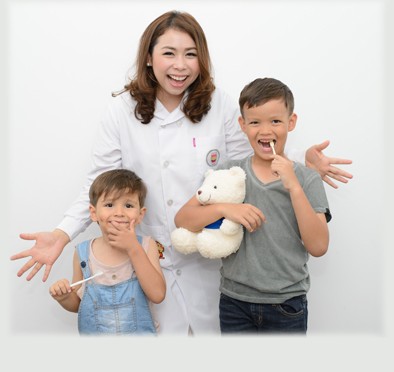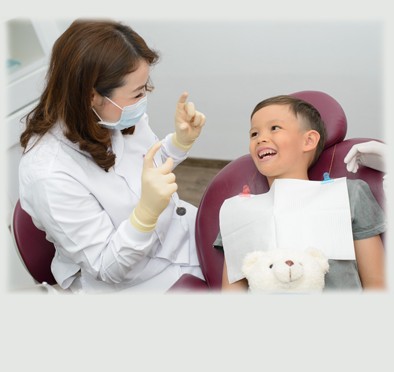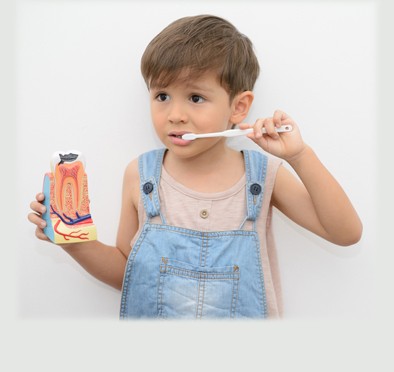Dental Care For Children
- Introduction
- First dental visit
- Toothache
- Preventive care
Introduction
One of a truth about tooth is getting a treatment at the most earlier is the better benefit. Although the primary teeth is going to fall out but they play significant roles:
1)To keep a primary teeth or baby ‘s teeth in place is important
because they help guide proper eruption of permanent teeth.
2) Avoid high bacteria counts from occurring that can create possible lifetime problems.
3) Provide formation of the shape of the mouth
4) They permit normal speech development
Treatment available :
1) Comprehensive examination
2) Prophylaxis cleaning
3) Fluoride or other anti caries agent substance application
4) Filling
5) Sealant ( Grove and fissure sealing)
6) Preventive filling restoration ( PRR )
7) Stainless steel crown ( SSC )and ceramic crown.
8) Pulpotomy and Pulpectomy
9) Extraction
10) Removable and fixed appliance for orthodontic purpose
11) Appliance for extra-habits treatment eg. thumb sucking.
12) Space maintainer device for permanent tooth in early loss primary tooth
13) Dietary counseling, dental caries control
14) Oral hygiene instruction : Brushing technique, home care and etc.

First dental visit
The first dental visit for kids is important for both children and parents. Our Pedodontic dentist will provide full dental examination including individual dental advice based on each child‘s dental health, food taking diet, habit and etc.
Our procedures would be:
1) Dietary counseling : For this process, pediatric dentist will interview a child about daily diet in order to evaluate the cause of dental caries and give advice for preventive care.
2) Psychological management by tell-show-do method.
Pediatric dentist will use simple words to make your child understand the procedures of dental treatment, and make him or her feel comfortable. Particularly, if a child has previous bad dental experience, it may take 1-2 more visits for the child to be less fearful.
3) X-ray examination. If it is needed, in tight contact posterior teeth, pediatric dentist may advise x-ray to find out hidden dental caries.
We try to avoid the amount of x-ray radiation as much as possible. However, dental x-ray radiation, especially in case of digital x-ray system, provides very minimal risk to overall health. If the hidden dental caries are not detected properly, it could cause a toothache later which requires more extensive dental procedure.
4) Preventive care advice and oral hygiene instruction and demonstration.

Toothache
The major cause of toothache in children is dental caries.
There are four possible procedures;
1) Dental filling
If the cavities does not expose the dental pulp, simple filling could be done but children have to be co-operative
2) Pulpotomy or Pulpectomy
In case that dental caries are exposed to dental pulp, pulpotomy or Pulpectomy is necessary. There are criteria of each treatment depending on severity. After this pulp treatment, stainless steel crown is advised for final restoration in most cases.
3) Extraction. If the decay is too extensive and possibly involves permanent tooth bud underneath, extraction might as well be a choice. In case that the baby tooth has been removed 6-12 months before the permanent tooth is erupted, space maintainer is recommended in order to preserve a space for permanent teeth.

Preventive care
One of Truth about tooth is that we should be able to maintain dental care at home since childhood. At Truth dental clinic, we are concerned about this the most.
We suggest simple methods as followed:
1) Oral hygiene instruction program
2) Sealant/Preventive resin restoration
3) Fluoride application
4) Dietary counselling
5) Home use Reminerizing agent
Apart from these, paediatric dentist will monitor certain habits that effect on abnormally dental occlusion and teeth alignment such as thumb sucking, tongue thrusting, bottle feeding and etc.
Several skeletal and dental malocclusion can be detected at the early stage by regular periodic recall from paediatric specialist and team which give advance treatment planning or proper timeline to refer to orthodontic treatment or any adjunctive treatment.








